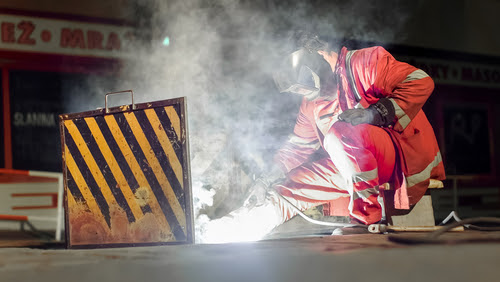In recent years, a spotlight has been placed on the dangers of asbestos and the health risks many railroad workers like conductors, trainmen, and switchmen (to name a few) were exposed to for decades while working for big railroads like CSX and Norfolk Southern. However, a serious health risk that does not get as much attention but can be just as lethal is exposure to diesel exhaust fumes.
Exposure to diesel exhaust fumes has been linked to serious health conditions, including cancers, leukemia, asthma, and chronic obstructive pulmonary disease (COPD). Workers in industries such as railroads, trucking, construction, and shipping face prolonged exposure to diesel emissions, often without adequate protective measures. Under the Federal Employers’ Liability Act (FELA), railroad workers who develop these conditions due to prolonged exposure to diesel fumes in the workplace may be entitled to compensation.
Our FELA lawyers have represented numerous rail workers who have suffered debilitating and even life-threatening illnesses due to exposure to toxic diesel fumes (including exposure to benzene).
What Are Diesel Exhaust Fumes?
The exhaust of diesel is made up of two primary parts: gases and soot. Each of these parts is made up of various substances. The gas portion of diesel exhaust is predominantly carbon dioxide, carbon monoxide, nitric oxide, nitrogen dioxide, sulfur oxides, and hydrocarbons, including polycyclic aromatic hydrocarbons (PAHs). The soot (particulate) part is made up of particles such as carbon, organic materials (including PAHs), and traces of metallic compounds. Both the gases and the soot of diesel exhaust contain PAHs.
Just imagine breathing in these particles and toxic fumes on a daily basis. Unfortunately, many railroad workers have been forced to, without proper protection or awareness by the railroad company, and the workers’ health has suffered greatly as a result. It is so disheartening when a railroad worker stricken with cancer, COPD, or debilitating asthma from diesel exhaust fume exposure calls our FELA lawyers and tells us that they need to file a FELA claim against the company they spent their lives working for.
Even worse, many times the railroad will drag their feet in settlement talks or try to avoid any liability for the railroad workers’ illness. This is why rail workers need to have experienced FELA personal injury attorneys on their side. The railroad claim agents and their attorneys are not your friends and will almost certainly look to reduce or avoid any type of financial responsibility when it comes to your diesel fume illness.
Health Risks of Diesel Fumes
Diesel exhaust contains a mixture of gases and fine particulate matter, including carbon monoxide, nitrogen oxides, sulfur dioxide, benzene, and formaldehyde. Long-term exposure can lead to severe respiratory and systemic health effects.
Cancer and Leukemia
The International Agency for Research on Cancer (IARC) classifies diesel exhaust as a known Group 1 carcinogen, meaning there is clear evidence that it causes cancer. Railroad workers, mechanics, and other industry professionals who are consistently exposed to diesel fumes face an elevated risk of developing lung cancer, bladder cancer, and leukemia due to the presence of benzene and other carcinogenic compounds.
Asthma and COPD
Diesel fumes are notorious for triggering inflammatory responses in the respiratory system, leading to chronic asthma, bronchitis, and COPD. Workers in enclosed environments, such as railyards, locomotive cabs, and maintenance facilities, may develop severe breathing difficulties after years of exposure.
Other Long-Term Effects
Prolonged diesel exhaust inhalation has also been linked to cardiovascular disease, immune system suppression, and neurological disorders.
FELA Claims for Diesel Exhaust-Related Illnesses
Railroad workers affected by diesel exhaust exposure may seek compensation under FELA. Unlike traditional workers’ compensation, FELA allows injured workers to pursue claims for pain and suffering, lost wages, medical expenses, and future disability.
To succeed in a FELA claim, the worker must prove that:
- The railroad company was negligent in providing a safe work environment.
- Exposure to diesel exhaust fumes in the workplace contributed to the illness.
- Protective measures, such as poor ventilation, lack of protective gear, or failure to limit prolonged exposure, were inadequate.
Railroads often fail to implement proper safety measures, such as ventilation systems in maintenance areas or high-quality air filtration in locomotives. In some cases, workers were not warned about the risks of diesel exhaust exposure despite well-documented health studies. If an employer ignores known hazards or fails to enforce safety regulations, it can be held liable under FELA.
Challenges and Compensation in FELA Cases
FELA claims can be complex, requiring medical evidence, expert testimony, and documentation of exposure levels. Victims may need to demonstrate that their cancer, leukemia, asthma, or COPD was directly linked to diesel exhaust exposure. Compensation under FELA can cover:
- Past and future medical expenses
- Lost wages and earning potential
- Pain and suffering
- Disability and reduced quality of life
Since FELA claims require proof of employer negligence, hiring an experienced railroad injury attorney is crucial. Legal professionals can help gather medical records, workplace exposure history, and expert analysis to build a strong case.
Call Our Firm for Legal Help
Diesel exhaust exposure poses significant health risks, particularly for railroad workers constantly exposed to fumes in their work environment. Under FELA, affected employees have the right to seek compensation if employer negligence contributed to their condition.
If you or a loved one has developed cancer, leukemia, asthma, or COPD due to diesel exhaust, pursuing a FELA claim can provide financial relief and hold negligent employers accountable for workplace safety failures.
Contact Shapiro, Washburn & Sharp to schedule a free consultation and find out how we can help. Our attorneys are dedicated to getting our clients and their families the financial compensation they deserve, like the $5 million wrongful death award we obtained for one client who died from asbestosis after spending 27 years working in Norfolk Southern’s car repair shop.
